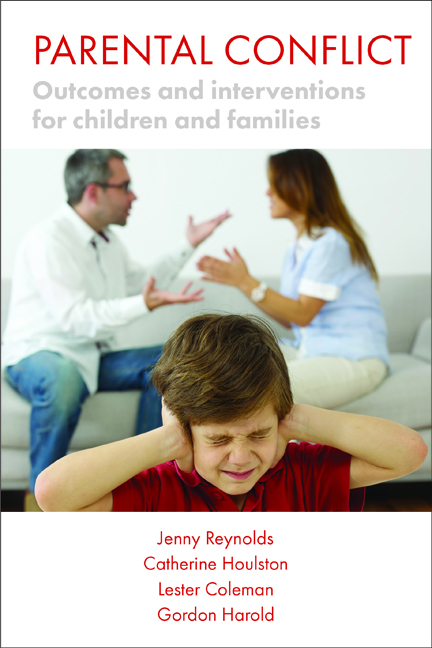Book contents
- Frontmatter
- Contents
- Foreword
- Preface
- 1 Conflict in context
- 2 Understanding different types of conflict
- 3 The impact of inter-parental conflict on children
- 4 How does inter-parental conflict affect children?
- 5 Risk and resilience: why are some children affected more than others?
- 6 Review of conflict-based interventions for couples
- 7 Implications for practice: How to help families
- 8 Conclusions and recommendations
- References
- Index
8 - Conclusions and recommendations
Published online by Cambridge University Press: 04 February 2022
- Frontmatter
- Contents
- Foreword
- Preface
- 1 Conflict in context
- 2 Understanding different types of conflict
- 3 The impact of inter-parental conflict on children
- 4 How does inter-parental conflict affect children?
- 5 Risk and resilience: why are some children affected more than others?
- 6 Review of conflict-based interventions for couples
- 7 Implications for practice: How to help families
- 8 Conclusions and recommendations
- References
- Index
Summary
Although conflict is a normal and necessary part of family life, this review has shown that how parents argue with one another can affect the happiness and adjustment of their children. Conflict, whether parents are together or apart, is particularly detrimental to children when it is frequent, unresolved, intense, and about the child. Meanwhile, couples who continue to positively relate to one another even in the midst of heated conflicts, and who can find ways to resolve an argument, are less vulnerable to relationship breakdown and their children are less at risk of developing emotional or behavioural difficulties. There is also initial evidence that children can learn from observing more constructive conflict behaviours modelled by their parents, which can in turn help them in their own social relationships.
Research over the past decade has provided deeper insight into, not only the outcomes for children of exposure to destructive conflict, but also how children are affected and why some children appear more vulnerable than others. This knowledge is useful in terms of developing interventions to help couples and parents manage their conflict more effectively and avoid the potentially negative influence on their children. This chapter will briefly identify the headline findings from this review before addressing ways that practitioners, policy makers and researchers can help to support families experiencing conflict.
Headline findings
• Children exposed to conflict between parents are at risk of a range of negative outcomes including: emotional and behavioural difficulties (such as depression or aggression); trouble getting on with others; such as peers or family members; problems settling and achieving at school; sleep difficulties; and poorer physical health.
• Conflict between parents, not just the event of parental separation or divorce, is a key factor in explaining why some children fare worse than others when parental relationships breakdown.
• Conflict affects how couples parent and the quality of the relationship between parent and child. Parenting may be affected in a number of ways, with parents adopting a range of behaviours, from highly intrusive and hostile parenting through to lax, uninterested (or neglectful) parenting, all of which are associated with negative developmental outcomes for children.
• Emerging research also points to the influence of interparental conflict on specific neurobiological processes for the child, which in turn affects their emotional and cognitive functioning.
- Type
- Chapter
- Information
- Parental ConflictOutcomes and Interventions for Children and Families, pp. 127 - 138Publisher: Bristol University PressPrint publication year: 2014



